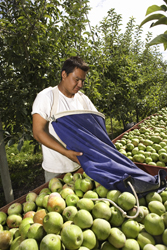Fine-tuning coordination in the European food supply chain
As the EU's Common Agricultural Policy (CAP) embraces free market policies, Europe's food chain and food system are facing many opportunities and challenges arising from this shift. The EU-funded project 'Key factors influencing economic relationships and communication in European food chains' (Foodcomm) investigated this phenomenon. It examined the role of stakeholders, analysed risks and proposed measures (e.g. increase cooperation among farmers, processors and retailers) to support this shift. The project reviewed food chain systems and surveyed stakeholders, from farmers to retailers, in several EU countries. It identified social, cultural and economic issues that affect cooperation within the food chains and articulated a theoretical framework for their upgrade. The results of the surveys and studies have led to country-specific recommendations for policymaking and sound business advice, based on improvements in economic relationships within the food chain. Specifically, the research results have underlined the social and economic factors that have compromised the links in the European food chain, particularly in the farming and agri-food sectors. The results have also revealed the importance of fostering strong relationships required to form new agri-food supply chains, raising competitiveness in an increasingly liberalised and globalised marketplace. If adopted, these policy recommendations and best practices will improve communication along the food chain and assist farm and business managers to adopt more sustainable agri-food supply chain models. In the meantime, the project website is helping disseminate relevant findings, reports and resources to key stakeholders and policymakers. Eventually, the food supply chain in Europe will overcome these obstacles, support a more sustainable food model and bring many benefits to the EU economy.







